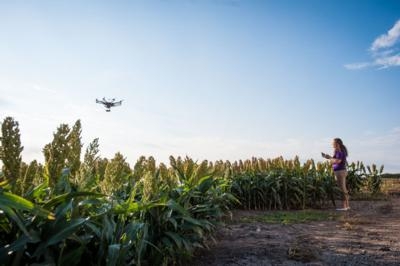Will Include Multi-Rotor And Fixed-Wing Platforms
Kansas State University's polytechnic campus has set a new precedent in the unmanned aircraft systems industry, becoming the first entity in the United States to receive approval from the FAA to provide UAS commercial flight training to both students and outside companies.

The authorization, which is referred to as a Section 333 exemption, allows Kansas State Polytechnic to create and conduct an extensive flight training program for unmanned aircraft operations. Previously, motion picture and television filming and aerial data collection have been given permission for commercial UAS operations; however, the approval has been limited to only training internally and in these two mission-specific areas alone. Kansas State Polytechnic's authorization is open to students both internal and external and is not restricted to any one particular application.
"Kansas State's UAS program continues to be a leader and innovator in the UAS industry," said Kurt Carraway, Kansas State Polytechnic's acting UAS program manager. "Our goal is to produce the most relevant and professional graduate possible, and we can now offer an exclusive flight training program that will take the student experience to the next level. Kansas State Polytechnic is essentially setting the standard on how to educate tomorrow's unmanned pilots."
The UAS program will incorporate the new flight training with current curriculum, building structured discipline that is modeled after the campus's manned professional pilot program. Starting in fall 2016, students will progress through multirotor training and multirotor instructor to fixed-wing operations and finally fixed-wing instructor. They also will focus on integration of components such as autopilots and sensors as well as advanced UAS employment activities.
Students are required to have a private pilot certificate with instrument rating and will have a specific number of unmanned flight hours they have to procure. Just as professional pilot students can become certified flight instructors teaching their peers to fly, once a UAS student reaches a certain rating, he or she can act as an instructor in entry-level flight courses.
"Another distinction of this FAA approval is being able to provide flight training to commercial partners," Carraway said. "For almost every industry there is a UAS application. We're proud to be able to partner with companies and provide them with the tools they need to integrate this technology into their sector while offering rigorous, specialized flight training operations."
Those learning commercial flight training can do so through two avenues that are exclusive to Kansas State Polytechnic. They can train out in the field under the auspices of the nationwide Certificate of Authorization that was included with this FAA approval. Students can also fly on campus inside one of the largest enclosed unmanned flight facilities in the country.
The campus's UAS bachelor's degree program began in 2011 and since doubled in enrollment almost every year. The initial degree focused on flight and operations; in fall 2015, a second bachelor's degree was added in UAS design and integration. Kansas State Polytechnic also is a core member of the FAA Center of Excellence for Unmanned Aircraft Systems.
"This campus prides itself on providing forward-thinking education and an environment where students learn by doing," said Verna Fitzsimmons, Kansas State Polytechnic's CEO and dean. "By having the opportunity to offer unmanned commercial flight training — something that has never been done before and exemplifies real world application — we are continuing the commitment of this campus's polytechnic tradition."
In October, the campus transformed from Kansas State University Salina to Kansas State University Polytechnic Campus.
(Image provided with Kansas State news release)
 ANN's Daily Aero-Linx (04.13.24)
ANN's Daily Aero-Linx (04.13.24) ANN's Daily Aero-Term (04.13.24): Beyond Visual Line Of Sight (BVLOS)
ANN's Daily Aero-Term (04.13.24): Beyond Visual Line Of Sight (BVLOS) Airborne 04.09.24: SnF24!, Piper-DeltaHawk!, Fisher Update, Junkers
Airborne 04.09.24: SnF24!, Piper-DeltaHawk!, Fisher Update, Junkers Aero-News: Quote of the Day (04.14.24)
Aero-News: Quote of the Day (04.14.24) ANN's Daily Aero-Term (04.14.24): Maximum Authorized Altitude
ANN's Daily Aero-Term (04.14.24): Maximum Authorized Altitude



